With their fluffy white coats and playful personalities, Bichon Frises have earned a reputation as charming and affectionate companions. But like any breed, they have unique behavioral traits and needs that require understanding. This comprehensive guide dives into the Bichon Frise temperament, expected behaviors, training techniques, exercise requirements, and more to help you build a fulfilling relationship with these endearing dogs.
Table of Contents
- 1 Getting to Know the Bichon Frise Temperament
- 2 Common Bichon Frise Behaviors and How to Manage Them
- 3 Effective Training Tips for Bichon Frises
- 4 Exercise Needs for a Healthy Bichon Frise
- 5 Grooming Requirements for Bichon Frises
- 6 Common Health Issues to Watch For
- 7 Finding and Choosing a Bichon Frise Puppy
- 8 Bringing Your Bichon Frise Home
- 9 Frequently Asked Questions About Bichon Frises
- 10 The Charming Companionship of Bichon Frises
- 11 Related posts:
- 12 Bichon Frise Colors: Unveiling the Spectrum
- 13 The Ultimate Guide to Understanding Bichon Frise Hypoallergenic Qualities
- 14 Bichon Frise Rehoming: Find Your Perfect Companion Today!
- 15 Bichon Frisé: All You Need to Know
Getting to Know the Bichon Frise Temperament
The happy-go-lucky Bichon Frise is renowned for its gentle and cheerful disposition. These small dogs thrive on human companionship and affection. Their friendly nature makes them ideal household pets, even for novice owners. Here’s an overview of the distinctive Bichon Frise temperament:
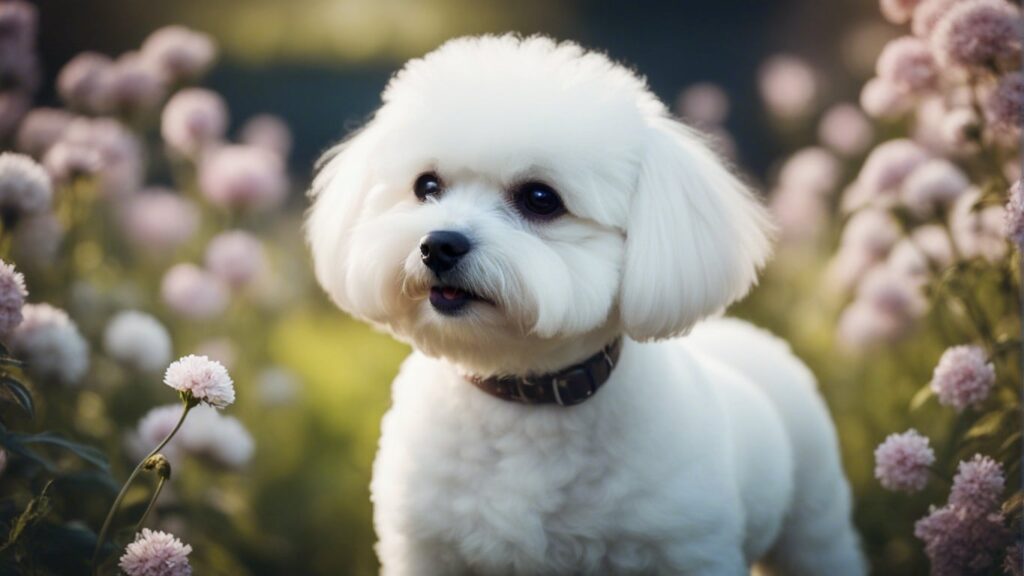
- Outgoing – Bichons love being around people and are not shy or aggressive. They’re always ready to make new friends!
- Playful – Fun and excitement are part of Bichon’s DNA. They delight in playtime and interactive games.
- Affectionate – Bichons form strong attachments to their families. They crave love, attention, and physical contact.
- Gentle – Despite their lively nature, Bichons are remarkably soft dogs. They’re patient and kind with children.
- Intelligent – Bichons are smart, obedient dogs when adequately trained. Their intelligence makes training enjoyable.
- Adaptable – This breed adjusts well to new environments. Bichons can thrive in any home setting.
- Sociable – Few dogs are as outgoing around other pets and strangers. Proper socialization enhances their friendliness.
While Bichons are known for having beautiful temperaments, each dog is unique. Early socialization and training will help nurture the best qualities in your Frise.
Common Bichon Frise Behaviors and How to Manage Them
Like any dog breed, Bichons can develop certain good and bad behavioral habits. Understanding their common behaviors allows you to encourage positive conduct and curb unwanted actions through proper training.
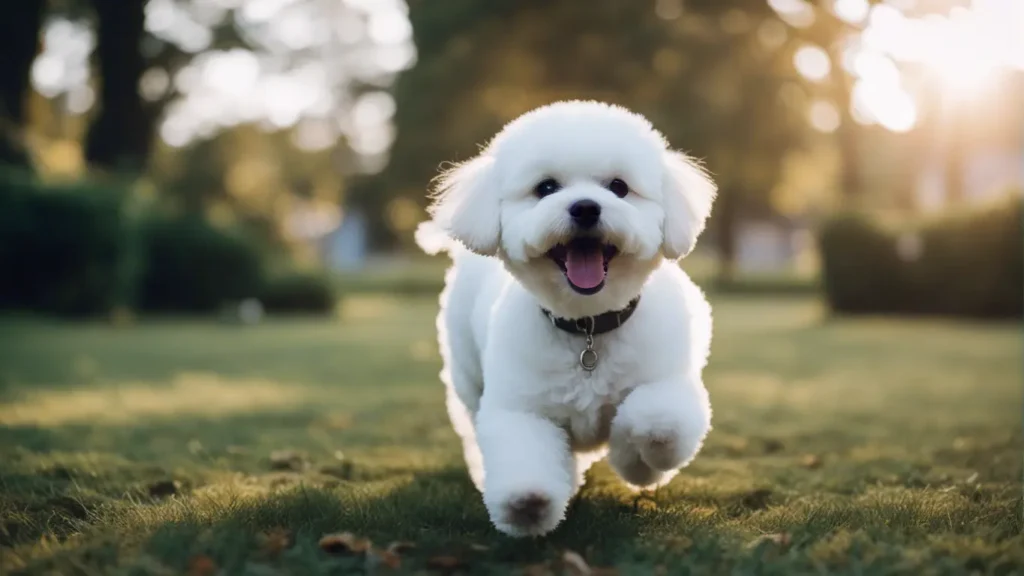
Here are some typical Bichon behaviors and tips for handling them:
Separation Anxiety – Since Bichons are so attached to their families, they may act out when left alone. Howling, destructive chewing and house-soiling accidents are possible signs of separation anxiety. Make sure your Bichon is comfortable sometimes by gradually increasing alone time and providing interactive toys to stay busy.
Excessive Barking – Alert and vocal by nature, the Bichon breed is prone to frequent barking. Reward your dog for being quiet. Discourage nuisance barking by removing attention. Anti-barking collars can also curb excessive vocalization when appropriately used.
Housetraining Challenges – While Bichons are intelligent, some may struggle to master housetraining quickly. Be patient and consistent with taking your dog outside frequently. Crate training and scheduled feeding times also aid the housetraining process. Never punish potty training accidents.
Digging – Bichons love to explore! This instinctual behavior lets them release energy and engage their natural curiosity. Provide acceptable digging outlets like a sandpit while redirecting any unwanted digging.
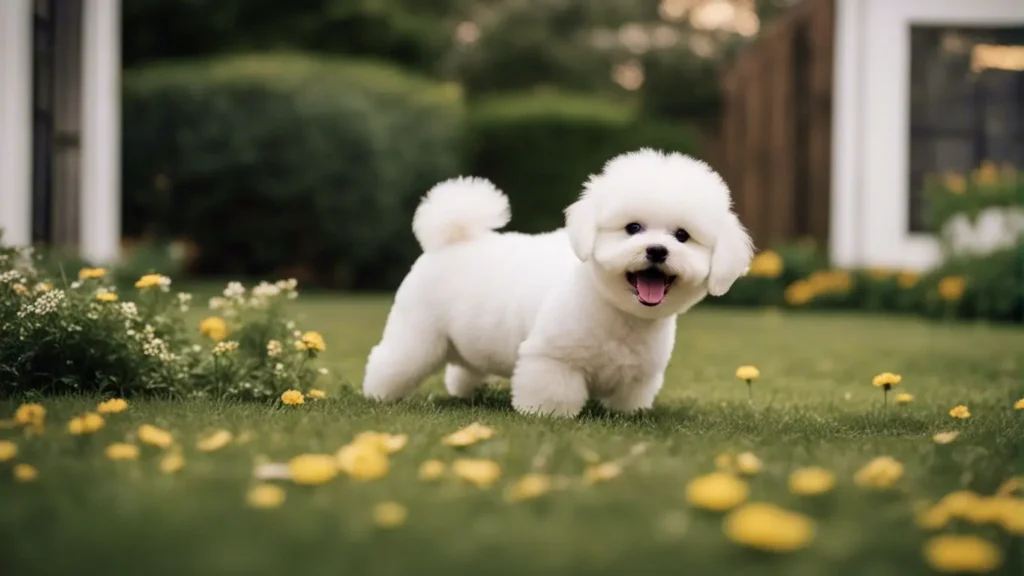
Chewing – Puppies and adolescent Bichons are prone to destructive chewing on shoes, furniture, etc. Provide plenty of chew toys to satisfy this need while keeping household items out of reach.
Chasing – The Bichon’s hunting ancestry can trigger chasing behaviors. Curb chasing cars, children on bikes, etc., through training. Teach and reward the “leave it” command.
Excitability – Bichons may jump up, nip, or herd people when overly excited. Discourage this behavior by ignoring your dog until he calms down. Ask for a “sit” before giving attention.
While challenging at times, negative behaviors can be improved through early intervention. Consistent training and meeting your Bichon’s needs will help manage troublesome conduct.
Effective Training Tips for Bichon Frises
The eager-to-please Bichon Frise is highly trainable, mainly when using positive reinforcement methods. Here are some critical tips for training your Bichon effectively:
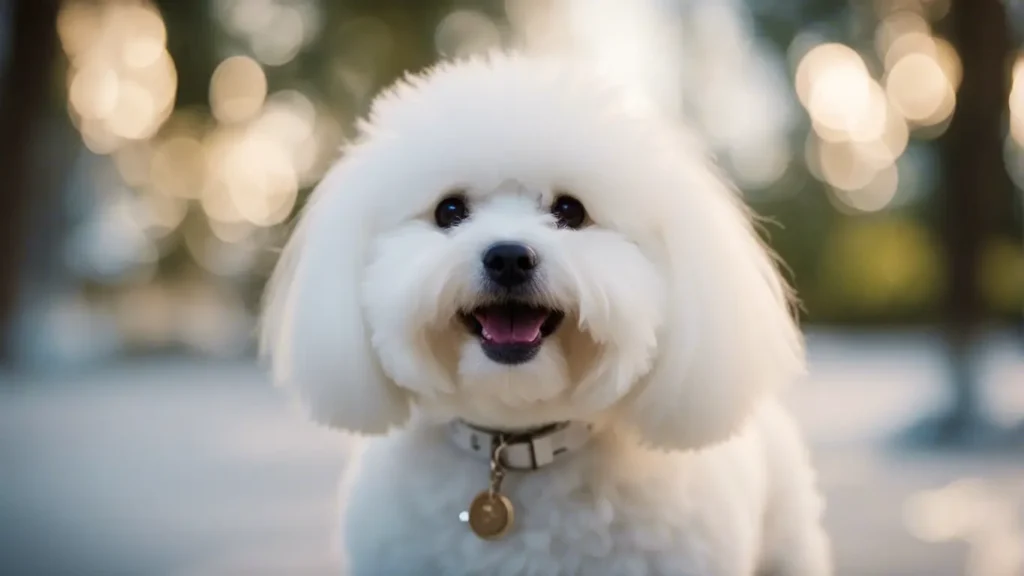
- Start early – Begin basic obedience when you bring your puppy or dog home. Early training gets behaviors off on the right paw.
- Use rewards – Food treats, praise, playtime, and affection motivate Bichons to obey commands better than punishment. Reward wanted behaviors immediately.
- Remain patient – Housetraining and learning commands takes time. Allow your Bichon to progress at his own pace through patient, persistent training.
- Keep sessions brief – Attention spans are short in puppies and young dogs. End each training session on a positive note after just 5-10 minutes.
- Be consistent – Use the same verbal cues and training techniques every time. Consistency avoids confusing your dog.
- Practice daily – Frequent short sessions are more effective than long occasional ones. Aim for 2-3 training periods per day.
- Use a clicker – Clickers provide instant sound feedback to mark desired actions. Pair with treats to make training more precise.
- Focus on one skill – Introduce new commands gradually and master them one at a time. Jumping between behaviors can frustrate dogs.
- Use a crate – Crates provide safe confinement when you cannot supervise. Crate training aids in housetraining as dogs avoid soiling their space.
- Address problems early – The longer negative behaviors continue, the harder they become to resolve. Don’t allow bad habits to become ingrained.
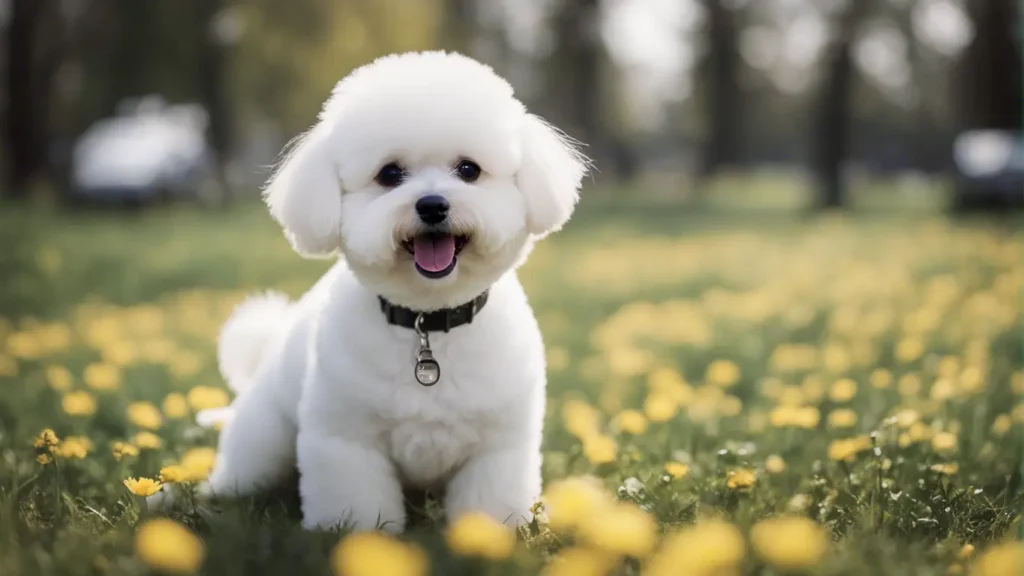
Proper training and socialization from a young age help Bichons become extraordinary companions. Their eagerness to work with their owner makes the training journey fun and rewarding.
Exercise Needs for a Healthy Bichon Frise
The energetic Bichon Frise requires adequate daily exercise to maintain both physical and mental health. Walks, playtime, and interactive activities provide essential stimulation. Here are some exercise tips tailored to your Bichon’s needs:
- Aim for 30-60 minutes daily – Adult Bichons need at least 30 minutes of exercise daily. Puppies and adolescent dogs may require closer to 60 minutes.
- Take two or more walks – Multiple shorter walks are ideal for Bichons rather than one long outing. Vary your walking routes, too.
- Play interactive games – Fun activities like fetch and chasing bubbles appeal to Bichon’s playful side while burning energy.
- Provide chew toys – Chewing satisfies chewing urges while providing mental stimulation. Supervise toy time to avoid swallowed pieces.
- Teach new tricks – Training short 5-10 minute sessions daily counts as a mental exercise. Continually teaching new tricks keeps Bichons engaged and focused.
- Visit dog parks – Well-fenced parks allow safe off-leash play with other pups. Supervise to ensure positive interactions.
- Try dog sports – Agility, rally obedience, flyball, and more tap into the Bichon’s athleticism. Contact local dog clubs to get involved.
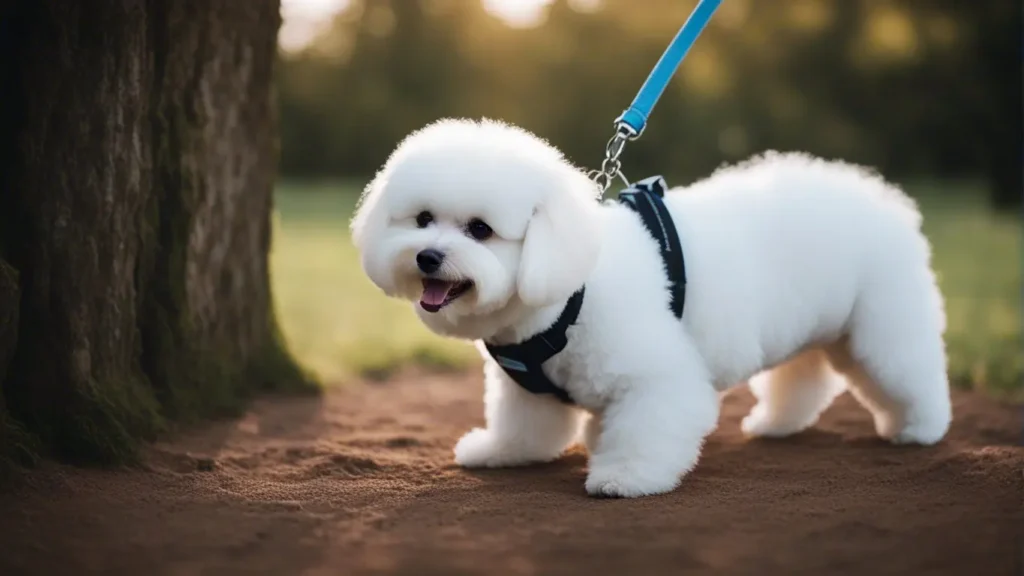
Puppies should only exercise 5 minutes per month of age until fully grown. Providing the right amount and type of activity benefits your Bichon’s health and behavior.
Grooming Requirements for Bichon Frises
The Bichon Frise’s adorable powder puff appearance comes from their plush double coat. Maintaining their beautiful fur requires regular grooming. Here’s what’s needed:
- Brush 3 times weekly – Frequent brushing prevents mats and removes dirt and loose hair before it tangles. Use a slicker brush and metal comb.
- Bathe monthly – Bichons don’t need frequent bathing, which can dry their skin. Use a moisturizing dog shampoo when you do bathe.
- Clip every 4-8 weeks – Their fur will grow continuously, requiring professional trims to maintain shape and manageability. Many owners prefer a shorter “puppy clip.”
- Clean eyes daily – Bichons are prone to tear staining around the eyes. Gently wipe stains daily with water and cotton. Trim hair around eyes.
- Brush teeth weekly – Daily toothbrushing is ideal to reduce dental disease risks. Work up to this gradually if needed.
- Trim nails monthly – Nails that get too long can snag and tear. Ask your groomer to trim them or do it carefully yourself.
- Check and clean ears weekly – Floppy ears trap moisture. Gently wipe out ears with disposable wipes to avoid infections.
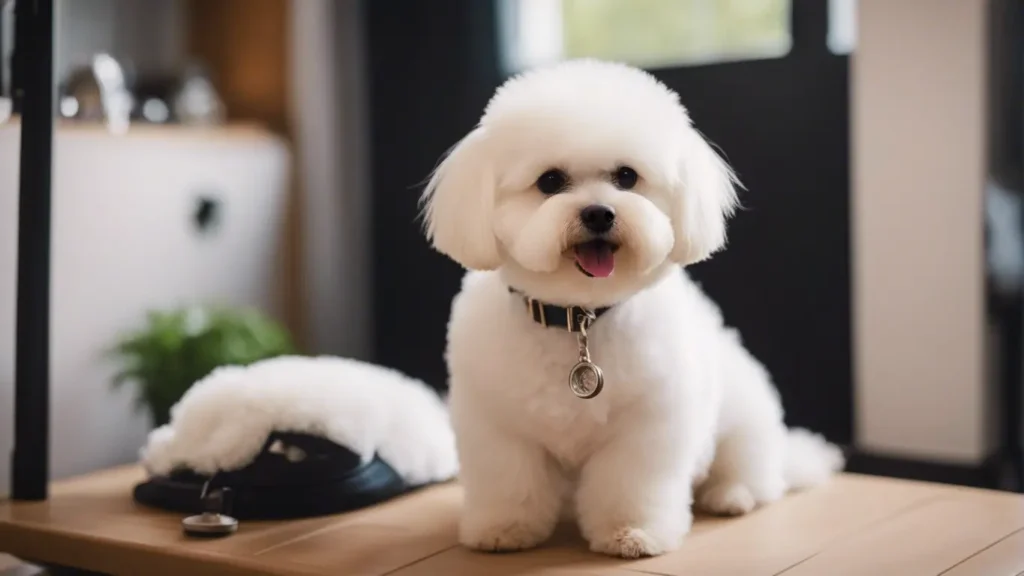
While it takes commitment, grooming is essential for your Bichon’s health and iconic appearance. Maintain a routine and schedule professional grooming as needed.
Common Health Issues to Watch For
Reputable breeders screen breeding dogs for known hereditary conditions. Still, some health issues occur more often in Bichons. Being aware of these helps you get prompt treatment:
- Skin allergies – Allergies to pollen, dust mites, dander, and foods may cause itchy skin or ear infections. Manage with medications, baths, and dietary adjustments.
- Dental disease – Bichons often have overcrowded teeth, putting them at high risk for periodontal problems. Brush frequently and provide professional cleanings.
- Luxating patellas – A genetic knee problem where the kneecap pops out of place. Causes lameness in affected legs. Mild cases are managed with medication or knee braces.
- Cataracts – Opacities in the lens of the eye causing vision loss. Surgery to remove cataracts may be an option to restore vision.
- Liver shunts – An abnormal blood vessel allows blood to bypass the liver. This results in toxins accumulating in the body. Symptoms appear between 4-16 weeks old. Surgery is the treatment.
- Obesity – Overfeeding and lack of exercise quickly lead to excessive weight gain. Obesity stresses joints and organs. Follow feeding guidelines and ensure adequate activity.
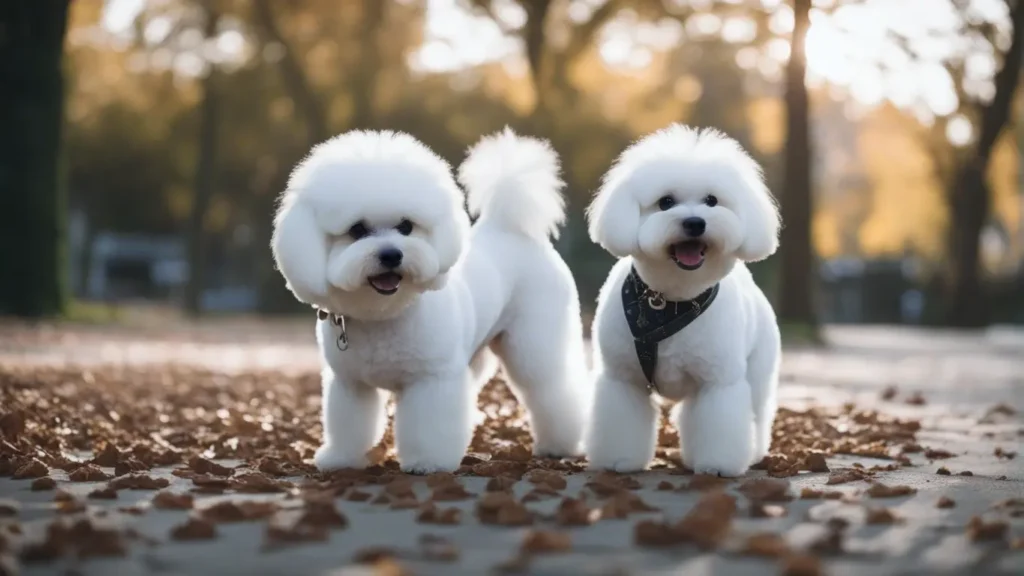
While distressing, many conditions are manageable with early veterinary intervention. Get to know your Bichon’s normal behavior and contact your vet if anything seems off. Annual exams also help detect any problems at an early stage. With attentive care, your Frise can enjoy excellent health.
Finding and Choosing a Bichon Frise Puppy
The fun part of Bichon ownership is picking out an adorable pup to welcome home! Here are tips on locating a reputable breeder and selecting the right puppy:
- Check breed clubs – Contact the national or regional Bichon Frise breed clubs for breeder referrals. These club members adhere to a code of ethics.
- Ask questions – Interview potential breeders about parent health testing, living conditions, socialization methods, and more. Run if they seem elusive.
- See puppies interacting – Visit the litter before they are eight weeks old. Puppies should seem lively and interested in their surroundings. Watch for healthy play.
- Review health records – Reputable breeders provide health clearances for breeding dogs and vaccination/deworming info for puppies.
- Assess personality – Temperament varies in each puppy. Observe their reaction to handling and stimuli to find the best fit for your lifestyle.
- Give time, not treats – The first puppy to approach may be the most food-motivated. Evaluate pups when not being offered treats.
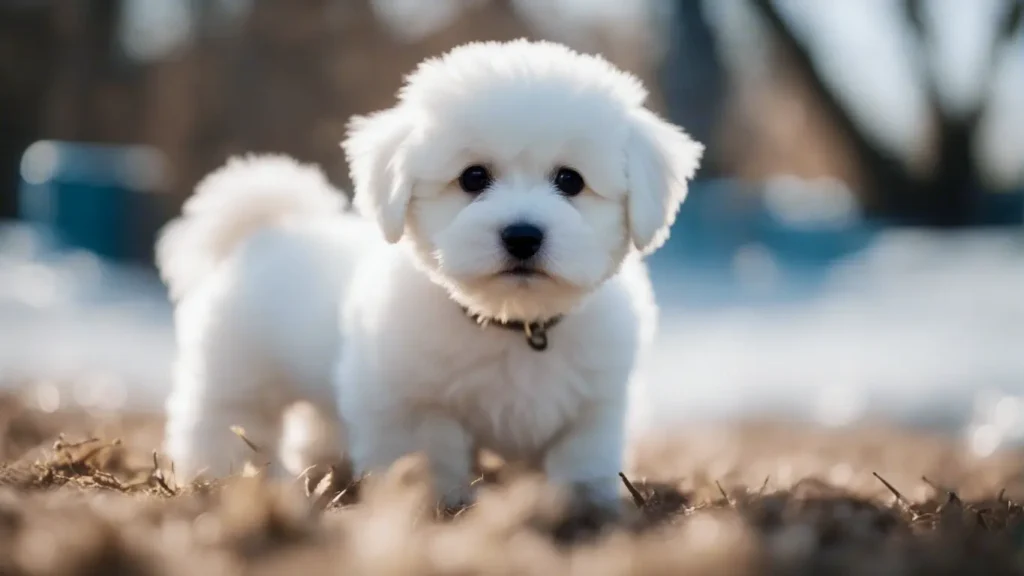
Taking your time is worthwhile to locate an ethical, responsible breeder. Then, let the puppy’s personality help guide your matchmaking process. The result will be a happy human-canine partnership for years to come.
Bringing Your Bichon Frise Home
Preparing for your Bichon’s arrival helps set them up for success. Follow these tips to ease the transition to their forever home:
- Puppy-proof – Lock away medications, toxic substances, chewable items, and small objects. Install baby gates to restrict access to some areas.
- Gather supplies – Have food, bowls, collar and leash, bed, toys, brush, toothpaste, etc. ready beforehand—set up a crate for crate training.
- Read up – Review housetraining, socialization, and basic training methods so you can start immediately. Consider enrolling in puppy kindergarten.
- Make a vet appointment – Schedule an initial puppy exam within a few days to ensure your new addition is healthy. Discuss vaccine and deworming schedules.
- Set a schedule – Establishing regular feeding times, potty breaks, training sessions, playtimes, and daily walks provides the essential structure for both of you.
- Dog-proof yard – Bichons love being outdoors. Ensure your yard is secure with proper fencing and hazards removed. Watch the use of fertilizers/chemicals pups may ingest.
- Give decompression time – Moving to a new home is exciting but stressful for puppies. Allow quiet time in a confined, safe space when first home before introducing the entire household.
- Stock up on cleaning supplies – Accidents will happen during housetraining. Stain and odor removers are a must to minimize odors that might attract repeated urination.

Your preparations give your Bichon the best opportunity to feel comfortable, confident, and ready to bond.
Frequently Asked Questions About Bichon Frises
Do Bichon Frises shed?
Bichons are low-shedding dogs, making them ideal for those with allergies. They do lose some hair, like any breed. Regular brushing catches most loose hairs. Trimming their fur also decreases shedding.
How often should I have my Bichon Frise groomed?
Bichons require professional grooming every 4-8 weeks. Their fast-growing outer coat needs regular trimming. Between full haircuts, commit to brushing 3+ times a week at home and provide occasional baths to look their best.
Are Bichon Frises easy to train?
Yes! The eager-to-please Bichon temperament lends itself very well to training. Their intelligence allows them to learn quickly when using positive reinforcement methods consistently. Bichons happily work for praise and treats.
Does Bichon Frises get along with other pets?
Socialized adequately from puppyhood, Bichons are quite amiable with other household pets, including dogs and cats. They do best in multi-pet homes when raised with other animals. Always supervise interactions between pets.
How long do Bichon Frises live?
The average lifespan for a healthy Bichon is 12-15 years. Providing excellent care, including proper nutrition, exercise, veterinary care, and grooming, contributes to a long, happy life.
Are Bichon Frises good family dogs?
Yes, the affectionate Bichon Frise temperament makes them a wonderful family dog. They adore both adults and children. Despite their small size, Bichons love active households. Families willing to commit to their grooming needs will be satisfied.
The Charming Companionship of Bichon Frises
Few breeds can compete with the Bichon Frise regarding sheer charm and personality. Their joyful spirit and unwavering affection endear them to all who meet them. While their beauty draws people in, their sweet temperament makes devotees for life out of Bichon owners.
You’ll be rewarded with a delightful companion when you commit fully to understanding and meeting their needs through thoughtful care and training. Sharing your days with an endearing Bichon provides laughter, comfort, and unconditional love. There’s no better dog for those seeking a furry best friend to cherish.